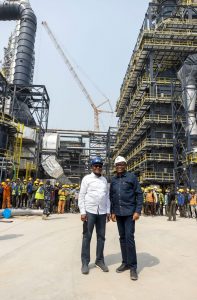AfDB’s Adesina sees Africa’s integration, industrialisation in Dangote Refinery
January 26, 20221.2K views0 comments
By Maduabuchi Efegadi
-
Refinery takes off Q3 2022 with 540,000bpd
Akinwumi Adesina, president of the African Development Bank, upon a visit to the gigantic Dangote Refinery and Petrochemicals complex being built in Lagos, Nigeria, has taken a long view to reach the verdict that beyond the products expected from it, the project holds huge prospects for Africa’s integration and industrialisation.

The Dangote Oil Refinery and Petrochemical plant project is costing $19.5 billion and for which the pan-African financial institution approved a $300 million facility, with Adesina describing it as a “game-changing initiative” that will spur Africa’s development and deepen regional integration.
Adesina, the continent’s premier development bank chief touring the Nigerian greenfield crude oil refinery and petrochemicals production plant owned by Dangote Industries Limited, said the plant, along with other industries in the Dangote Group, is an “Africa growth accelerator.”
The industrial complex is located in the Lekki Free Trade Zone, Lagos, on a land area covering approximately 2,635 hectares.
In 2014, the AfDB board approved a $300 million loan to Dangote Industries Limited to support the construction and operation of the greenfield crude oil refinery and the greenfield fertilizer manufacturing plant. The two facilities are expected to create 38,000 jobs during construction.
“I am completely blown away by the magnitude of what I see here. This is a world-class industrial complex that will make Nigeria and Africa proud. We at the African Development Bank are proud of this project. Every African country needs to have an Aliko Dangote to help the continent industrialise. Dangote’s success demonstrates that governments should prioritise industrialization. We must continue to support the private sector, considering the value they bring,” Adesina said.
He noted that the oil refinery and petrochemical plant projects are examples of the AfDB’s strategy for fostering industrialization through improved natural resource transformation and exports, as well as support to accelerate indigenous African entrepreneurship.
Adesina said the African private sector was crucial to the execution of the African Continental Free Trade Area; adding that the Dangote Group president and chief executive, Aliko Dangote, the refinery, which has the capacity to meet 100 percent of Nigeria’s requirements for refined products with a surplus for export, is the largest single train petroleum refinery in the world, with a capacity to process 650,000 barrels of crude oil per day. It is estimated that by 2023, Nigeria will import zero petroleum oil products – down from approximately $50 billion current oil product imports per year.
But Dangote, speaking at the weekend, said the plant would take off in the third quarter of this year (Q3 2022) with a processing capacity of 540,000 barrels per day.
The refinery includes a 440-million-litre water treatment tank farm and a housing estate built for 50,000 staff and their families onsite.
For Dangote, the refinery’s owner, “the support of the Nigerian government, our lenders, and development finance institutions like the African Development Bank, without whom we would not have come this far, are much appreciated.
“We have enjoyed a good working relationship with the Bank and this visit further encourages us,” said Dangote.
The fertiliser facility has two production train lines, with each producing 2,200 tonnes of ammonia and 4,000 tonnes of granulated urea each day, Dangote explained, adding that the first train was built and deployed in the second quarter of 2021 with more than 300,000 tonnes of urea produced and sold as of the fourth quarter of 2021, primarily to export markets.
According to him, the second production train is expected to be commissioned in the first quarter of 2022, adding that the plant, along with other fertiliser companies like Indorama Eleme Fertilisers & Chemicals (IEFCL) and Notore Chemicals Ltd, now make Nigeria a net exporter of fertiliser.
